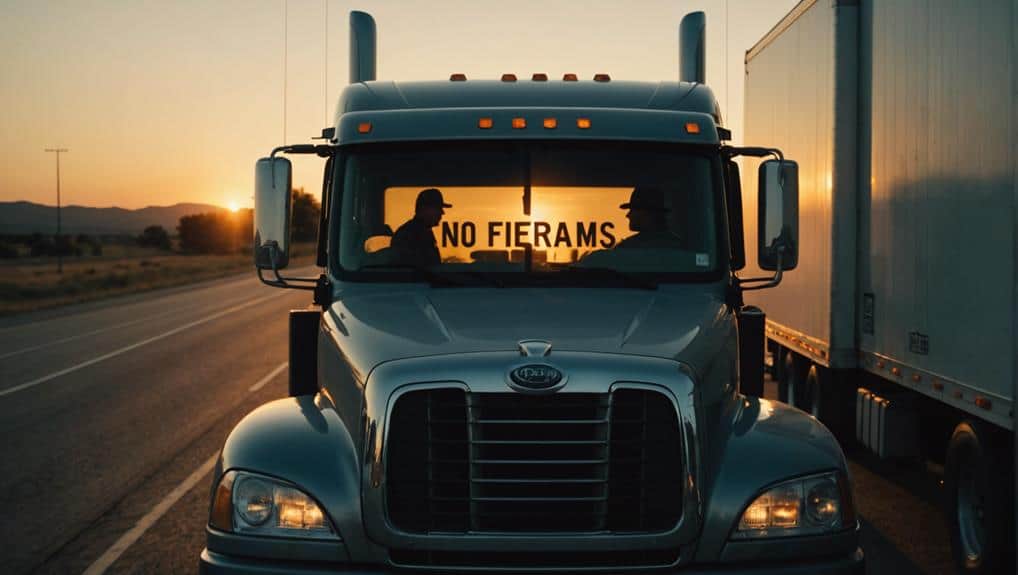What Is the Best Self-Defense for Truckers?
If you’re a trucker, your best bet for self-defense is to carry non-lethal tools like pepper spray, heavy flashlights, or even a trusty tire thumper. Trust me, you don’t want to mess with strict no-weapon policies from companies like Swift or J.B. Hunt—they’ll fire you in a heartbeat. Focus on awareness and mental preparedness, knowing your limits, and practicing situational awareness. Getting some self-defense training can make a world of difference too. Just imagine, you’re rolling down the highway, feeling safe and secure. Curious about how to keep the wheels turning without any hiccups? Let’s explore!
 Maneuvering the intricacies of trucking company firearm policies can be challenging, especially when safety and liability concerns are at play. Major trucking companies like Swift Transportation and J.B. Hunt enforce strict no-weapon rules. Violating these company policies can lead to termination and blemish your employment history through DAC reports. It’s like walking a tightrope, where one slip can send you plunging into joblessness.
While there aren’t federal regulations banning firearms in commercial trucks, state laws vary wildly, adding another layer of complexity. Your rights as a driver might be firmly upheld in one state but completely disregarded just a few miles down the road. Insurance brokers say that allowing firearms doesn’t necessarily make you uninsurable, yet many companies still prioritize these stringent policies over employee autonomy.
With high turnover rates—83% for large carriers—one has to wonder if these restrictive firearm policies contribute to trucker dissatisfaction. It’s no secret that feeling powerless over your own safety can make the open road seem a lot lonelier. The balance between protecting company interests and respecting drivers’ rights remains a delicate dance, one that’s far from being mastered.
Maneuvering the intricacies of trucking company firearm policies can be challenging, especially when safety and liability concerns are at play. Major trucking companies like Swift Transportation and J.B. Hunt enforce strict no-weapon rules. Violating these company policies can lead to termination and blemish your employment history through DAC reports. It’s like walking a tightrope, where one slip can send you plunging into joblessness.
While there aren’t federal regulations banning firearms in commercial trucks, state laws vary wildly, adding another layer of complexity. Your rights as a driver might be firmly upheld in one state but completely disregarded just a few miles down the road. Insurance brokers say that allowing firearms doesn’t necessarily make you uninsurable, yet many companies still prioritize these stringent policies over employee autonomy.
With high turnover rates—83% for large carriers—one has to wonder if these restrictive firearm policies contribute to trucker dissatisfaction. It’s no secret that feeling powerless over your own safety can make the open road seem a lot lonelier. The balance between protecting company interests and respecting drivers’ rights remains a delicate dance, one that’s far from being mastered.
 Finding your way through the maze of federal and state regulations on self-defense for truckers can be challenging, especially since there’s no uniform law across the board. Federal law doesn’t explicitly prohibit firearms in commercial trucks, but you’ll quickly discover that state laws vary greatly. This patchwork of regulations can make carrying firearms a tricky endeavor for truck drivers. Some states permit self-defense tools like pepper spray and disguised stun guns, but others may restrict or ban them entirely.
Navigating these rules requires a good understanding of several critical areas:
Finding your way through the maze of federal and state regulations on self-defense for truckers can be challenging, especially since there’s no uniform law across the board. Federal law doesn’t explicitly prohibit firearms in commercial trucks, but you’ll quickly discover that state laws vary greatly. This patchwork of regulations can make carrying firearms a tricky endeavor for truck drivers. Some states permit self-defense tools like pepper spray and disguised stun guns, but others may restrict or ban them entirely.
Navigating these rules requires a good understanding of several critical areas:
 Being mentally prepared and aware can be a trucker’s greatest asset on the road. When you’ve got a proactive mindset, you’re better equipped to prevent dangerous situations before they escalate. Situational awareness is like having a sixth sense; you need to recognize pre-incident indicators, such as suspicious behaviors, which can signal potential threats. This way, you can take evasive action before things get out of hand. Additionally, tools like the 2n1 Personal Burglar Alarm can offer extra security, giving truckers a reliable way to deter potential attackers. Keeping a balanced focus on your surroundings, rather than being constantly vigilant, helps you notice potential dangers without getting overwhelmed by stress. Here’s a quick list to keep in mind:
Being mentally prepared and aware can be a trucker’s greatest asset on the road. When you’ve got a proactive mindset, you’re better equipped to prevent dangerous situations before they escalate. Situational awareness is like having a sixth sense; you need to recognize pre-incident indicators, such as suspicious behaviors, which can signal potential threats. This way, you can take evasive action before things get out of hand. Additionally, tools like the 2n1 Personal Burglar Alarm can offer extra security, giving truckers a reliable way to deter potential attackers. Keeping a balanced focus on your surroundings, rather than being constantly vigilant, helps you notice potential dangers without getting overwhelmed by stress. Here’s a quick list to keep in mind:
 In the world of trucking, staying safe starts with keeping your eyes peeled and your wits about you. You’ve got to spot trouble before it spots you, using situational awareness techniques to notice anything out of the ordinary, like sketchy behavior or aggressive movements. Carrying a reliable self-defense flashlight, such as the 3000 Lumen LED model trusted by law enforcement, can greatly enhance your safety. And when things get hairy, non-lethal tools like a heavy flashlight or even wasp spray can be your best friends, giving you a chance to defend yourself without breaking any company rules.
In the world of trucking, staying safe starts with keeping your eyes peeled and your wits about you. You’ve got to spot trouble before it spots you, using situational awareness techniques to notice anything out of the ordinary, like sketchy behavior or aggressive movements. Carrying a reliable self-defense flashlight, such as the 3000 Lumen LED model trusted by law enforcement, can greatly enhance your safety. And when things get hairy, non-lethal tools like a heavy flashlight or even wasp spray can be your best friends, giving you a chance to defend yourself without breaking any company rules.
Trucking Company Firearm Policies

Legal Self-Defense Tools
When you’re out on the road, staying safe means knowing what tools you can legally carry. Many truckers turn to non-lethal options like pepper spray or stun guns, but you’ve got to be aware that what’s allowed can change from state to state. For instance, keychain pepper sprays are popular due to their discreet and portable nature. Additionally, some truckers opt for panic alarms which emit loud noise to draw attention and deter threats. So, before you pack up, make sure you’re up to speed on the laws to avoid any nasty surprises!Non-Lethal Alternatives
As a trucker, your safety on the road is paramount, and non-lethal self-defense tools offer you practical options without the legal complications of firearms. Non-lethal self-defense tools, like pepper spray and stun guns, are great for truck drivers facing safety issues. They’re effective, easy to use, and often align with company policy. Pepper spray is widely permitted, making it a popular choice for personal safety. For instance, the Wildfire 1.4% MC pepper spray is compact and includes a quick-release key chain for easy access. Stun guns are another option, though they might need permits. Always check local regulations to stay on the right side of the law. Besides these, there are alternative self-defense tools. Tire thumpers and heavy flashlights can serve double duty—checking your tires and fending off threats. Baseball bats and even wasp spray can be surprisingly effective in a pinch. Just remember, legal considerations require you to justify using any of these tools. Misuse can lead to serious consequences, just like with firearms. Since many companies ban firearms in trucks, sticking to permitted tools is essential. Ensuring your personal safety while complying with these rules can be challenging, but with the right non-lethal alternatives, you’re well-equipped to handle emergencies without breaking the law. Stay safe out there!State Law Variations
Maneuvering the complex landscape of state laws regarding self-defense tools is vital for truckers who want to stay safe and compliant. It’s like traveling through a maze, but instead of cheese, you’re after peace of mind. State laws vary greatly, so what’s legal in one place might land you in hot water in another. Some states let you carry pepper spray, while others might frown upon a stun gun unless you’ve got a permit. For truck drivers, knowing the legal use of each self-defense option is key. Non-lethal self-defense tools like wasp spray or heavy flashlights can be your best friends on the road. Most states let you carry these without a permit, making them hassle-free choices. However, some products, such as the Pink Leopard Pepper Shot, offer both effectiveness and portability, making them ideal for truckers. But, understanding local regulations is vital. Violating weapon carry laws can result in criminal charges or even job loss, especially if your company has strict policies. The USCCA’s Concealed Carry Reciprocity Map can be a lifesaver here. It guides you on the legal status of various self-defense tools across different states, helping you stay compliant. Remember, not knowing the law is no excuse, and staying informed keeps you safe and employed.Federal and State Regulations

- Federal and State Laws: While federal law doesn’t ban firearms in trucks, state laws can be wildly different. Some states allow self-defense tools like pepper spray, but others may restrict stun guns or other items.
- Company Policies: Many trucking companies enforce strict no-weapon policies. Violating these policies can lead to termination, regardless of state laws.
- Hazmat Endorsements: If you have a hazmat endorsement, be prepared for extensive background checks and additional regulations which make carrying firearms even more complicated.
- Firearm Storage: Legal requirements for firearm storage are another hurdle. Typically, you must keep firearms unloaded, locked, and securely stored.
Importance of Self-Defense Training
Understanding the labyrinth of federal and state regulations is just one piece of the puzzle for truckers. You also need to be ready for unexpected dangers on the road. That’s where self-defense training comes in. It’s not just about throwing punches; it’s about being prepared for potential threats. Carrying self-defense tools, like pink stun guns, can provide an extra layer of protection. Organizations like the USCCA offer exceptional training programs. They’ve got over 834,181 people relying on them for firearms education and self-defense tips. With their help, you’ll learn the latest techniques to stay safe. Just imagine knowing exactly how to handle a scary situation because you’ve practiced it a hundred times! But it’s not just about the physical stuff. You’ve gotta know the legal implications too. What if you defend yourself and end up in court? Not fun, right? That’s why USCCA’s training includes legal advice, so you understand the self-defense laws and can make smart choices. Regular updates and resources from these training programs keep you sharp and confident. They make sure you’re always in the loop about new techniques and legal changes. So, get trained, stay prepared, and keep those potential threats at bay!Mental Preparedness and Awareness

- Develop a Proactive Mindset: Anticipate problems before they arise and plan your responses.
- Enhance Situational Awareness: Notice pre-incident indicators like unusual activity or behavior.
- Utilize De-escalation Techniques: Calmly diffuse tension during confrontations to reduce the likelihood of violence.
- Avoid High-Risk Areas: Know which places are more dangerous and plan your routes to steer clear of them.
Navigating Company Policies
Maneuvering company policies can be a tricky endeavor for truckers, especially when it comes to self-defense. You’ve got to be on your toes because major trucking companies, like Swift Transportation and J.B. Hunt, don’t mess around with their rules. They generally prohibit carrying firearms, and if you’re not in compliance, you could find yourself without a job real quick. Truck drivers need to be aware of both federal and state laws regarding firearms. Carrying a firearm legally in one state might get you into hot water in another. Plus, company policies often ban weapons altogether, regardless of whether you have a permit or not. They cite liability issues—like potential accidents or misuse—as their reason, and violating these policies can lead to a nasty entry in your DAC report, which isn’t fun for future job prospects. It’s essential to understand your company’s no-weapon policies. Even if you’ve got a permit, you must review the specific regulations and guidelines of your employer. Don’t risk it—losing your job over a self-defense tool isn’t worth the headache. Stay informed, stay compliant, and keep yourself and your career safe.Personal Safety Strategies

Situational Awareness Techniques
Truck drivers face unique challenges on the road, making situational awareness a critical component of their personal safety strategies. Being alert and aware of your surroundings can make all the difference in keeping you safe from potential threats. Let’s break it down:- Assess Your Surroundings: Always scan the environment for any unusual activity. Look for pre-incident indicators like aggressive behavior or suspicious attire. Your mental awareness can help you spot trouble before it starts. Additionally, consider using simple security devices like a magnetic door/window alarm to notify you of any unauthorized entry.
- Know Your Routes: Familiarize yourself with safe routes and avoid high-risk areas, especially late at night. This enhances your personal security by keeping you out of dangerous situations. Also, keep a map or GPS handy to quickly reroute if you encounter unexpected roadblocks or detours.
- Basic Safety Measures: Think of your truck as your home on wheels. Secure personal belongings, lock your doors, and avoid walking between trucks in poorly lit areas. These simple steps can go a long way in boosting your safety. Regularly check your locks and alarms to verify they are functioning correctly.
- Distract Potential Threats: Carry items like heavy flashlights or non-lethal distractions. If you sense danger, these can help attract attention and deter attackers. Consider devices that emit loud noises to startle potential threats and buy you time to get to safety.
Non-Lethal Defense Tools
When it comes to non-lethal defense tools, truck drivers have a variety of options that can effectively enhance personal safety without resorting to firearms. You’ve got choices like pepper spray and stun guns, which can be lifesavers in a pinch. Now, pepper spray is usually allowed in most places, but stun guns might need a permit depending on where you’re driving. That’s where knowing your local laws is vital. Beyond the usual suspects, think about everyday items. A tire thumper or even a hammer can double as improvised defensive weapons. It’s all about situational awareness and being resourceful. Imagine someone threatening you, and you’ve got a heavy flashlight in hand. Not only can it light up the situation, but it also makes a heck of a noise if you bang it against something, drawing attention to your plight. Don’t forget to take into account safety issues and legal considerations. Attracting attention can be your best bet sometimes. A whistle or making noise with your tools can scare off troublemakers. Just remember, knowing your company policies and local laws will keep you out of legal hot water. Stay safe out there!Resources for Truck Drivers
Steering through the trucking industry can be intimidating, but you don’t have to go it alone. As a truck driver, your self-defense and safety are paramount, and there are plenty of resources to help you navigate this journey. Here are some valuable tools to reflect on:- High Road Training Program: Immerse yourself in this thorough training program, which offers essential skills and knowledge specific to the trucking industry at no cost upon registration. It’s a perfect starting point.
- USCCA Membership: Join the 834,305 individuals who benefit from the USCCA’s training and educational resources. They focus on firearms education and self-defense preparedness, giving you essential legal knowledge and practical skills.
- Truckers Forum: Connect with fellow truckers on this community platform. Share experiences, seek advice, and get support on personal safety and industry challenges. It’s like having a chat with a friend who gets it.
- Trucking Truth: This platform offers tools and resources to help you understand the trucking industry better. Stay informed about safety practices and prep for your career with valuable insights.
Frequently Asked Questions
What Do Truckers Use for Self-Defense?
You might think it’s hard to stay safe on the road, but truckers use pepper spray options, tactical flashlights, and personal alarms. They take self-defense classes, use non-lethal weapons, and rely on situational awareness and self-defense apps.What Is the Most Effective Self-Defense Weapon?
You should consider pepper spray for its effectiveness and a tactical flashlight for its versatility. A self-defense keychain, a personal alarm, or a tactical pen also work well. Don’t forget self-defense training and situational awareness tips.Can Truck Drivers Carry Guns in the Us?
You can carry a gun in the U.S. as a truck driver, but you must navigate varying state gun laws, concealed carry permits, and legal considerations. Focus on self-defense training and defensive tactics for trucker safety in emergency situations.What Do Truckers Want the Most?
You want to prioritize road safety, maintain your truck, and manage sleep schedules. Healthy meals, efficient route planning, organized gear storage, reliable communication devices, and thorough emergency kits are essential. Don’t forget to stay updated on legal regulations.
Facebook
LinkedIn
Pinterest
X
Joseph Lombardi
Joseph Lombardi is an esteemed Army combat veteran whose valor and leadership were honed during Operation Iraqi Freedom. His military career is marked by exemplary service and dedication, earning him numerous commendations for bravery and tactical prowess. Transitioning from the battlefield to the business world, Joseph channeled his extensive experience into founding Para Bellum Defense, a premier self-defense products company.
As the owner and CEO of Para Bellum Defense, Joseph brings a unique blend of military discipline and strategic acumen to the forefront of the self-defense industry. His company specializes in innovative and reliable products designed to empower individuals and ensure their safety in an increasingly uncertain world. Under his leadership, Para Bellum Defense has rapidly gained a reputation for excellence, driven by Joseph's unwavering commitment to quality and customer satisfaction.
In addition to his entrepreneurial success, Joseph boasts a decade-long career in executive protection and security. His expert skills in threat assessment, risk management, and personal protection have made him a sought-after professional in the field. Joseph's dedication to safeguarding others extends beyond his professional endeavors, as he actively participates in community outreach programs aimed at promoting safety and self-defense awareness.
With a firm belief in preparedness and empowerment, Joseph Lombardi continues to inspire and protect, embodying the true spirit of a warrior and a guardian.

